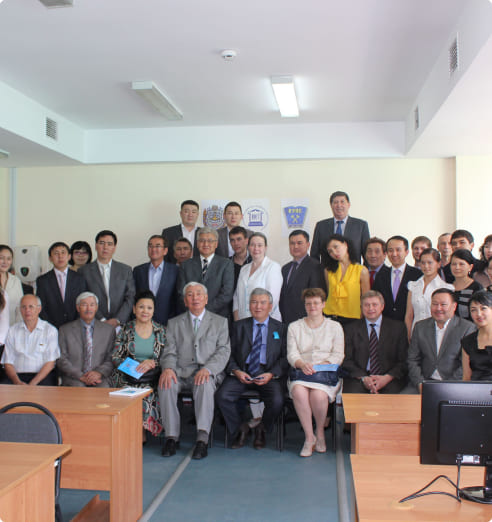The University has re-issued a state license № KZ58LAA00004977 dated 29.05.2015 year. The University has reissued state license № KZ58LAA00004977 dated 05.29.2015.
Since 2003 and currently Presidentof the University is a Doctor of Technical Science, Professor, Academician of the International Academy of Transport Omarov Amangeldy Dzhumagalievich.
Teaching staff of the University consists of leading scientists and transportation system workers who have passed many stages of career development in the transport sector.
In order to meet modern international standards in the field of higher education IUTH in 2004, 2008, 2013, 2015 has successfully passed the state certification of the Ministry of Education and Science of the Republic of Kazakhstan..
Near International University of Transportation and Humanities Technical and Economic College and Astana Technical and Economic College are in operation which allow to graduate with required specialties of transport and communication complex, and in the future to get higher education at the university.
Currently, the International University of Transportation and Humanities is training personnel in 8 areas of training (15 educational programs) for bachelor's degree, 4 areas of training (20 educational programs) for master's programs and 2 areas for doctoral studies (3 educational programs).
From 2004 to 2011 in the University Specialized Dissertation Council for doctoral theses in the specialties: 05.22.06 - Track, research and designing of railways and 05.05.04.- Weight-handling, building and road was functioning.
IUTH issues the journal "International University of Transportation and Humanities" and the newspaper "Express TJ" which are registered in the Ministry of Information of the Republic of Kazakhstan.
University has partnerships with higher education institutions such as Chun Qing Transport University (China), Technical University of Varna (Bulgaria) Lublin University of Technology (Poland), Technical University of Applied Science, Vildau (Germany), Bauman Moscow State Technical University, M.A. Bonch-Bruevich St. Petersburg State University of Telecommunications, Moscow State University of Railway Engineering (MIIT), Petersburg State Transport University (PSTU), Siberian State Automobile and Highway Academy (SibADI) Tashkent Institute of Railway Transport Engineers (TashIRTE), Kyrgyz State University of Construction, Transport and Architecture (KSUCTA) and many others.







